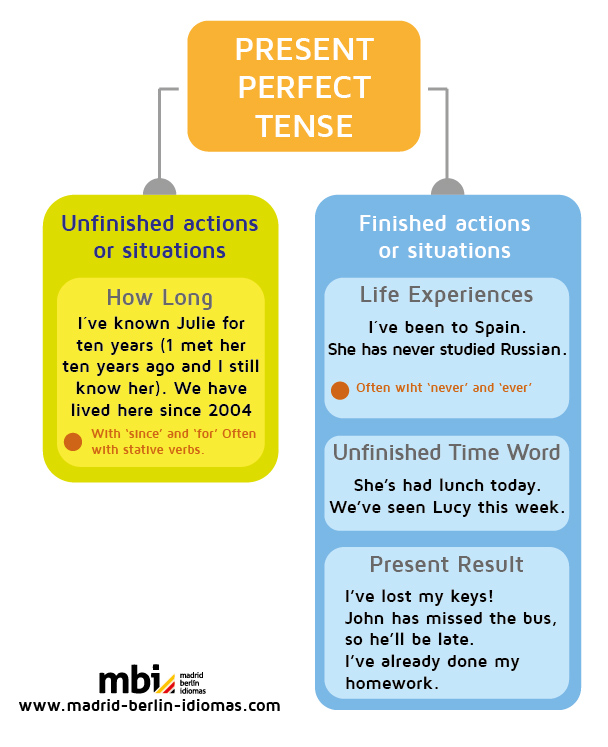
present perfect 1 The present perfect tense has a number of uses
- 1. We use it to talk aboutexperiences
1.1. I´ve worked in a lot of countries
1.2. Have you ever been to Australia?
1.3. She´s won many/ awards for her books ( a lot of?)
WHEN these things happened is not important– the focus is on the action/state, NOT when it happened
But if we say when we had the experience, we MUST use the past simple.
I´ve visited Mainz several times.
BUT
I visited Maiz for the first time in 1987.
We can NEVER use the present perfect with a time in the past.
I have been to Spain in 1993 xxxxxx NOOOOOO
But to give more information about an experience, we use the Past Simple
I´ve worked in two other Central American countries. I had a great time in both places.
- ·2.We also use the present perfect to talk about things that are unfinished-
unfinished states and unfinished periods
“this month/week/year” etc. and with “this morning/afternoon etc.” IF IS STILL THAT TIME OF DAY.
I´ve known him since I was 11 (unfinished state, because I met him when I was 11. I still know him now. The Present perfect is acting as a bridge between the past and the present.
En español: le conozco desde (y sigo conociéndolo)
I´ve had this yatch for almost five years.
Tengo… desde hace (y lo sigo teniendo)
We´ve lived here since I was a five year old
boy. Vivo aquí desde que tenía cinco años. (y sigo viviendo aquí)
Have you been here long?
¿Llevas aquí mucho rato?
I’ve been sitting here for an hour trying to think of a way to solve our problem.
Llevo aquí sentado una hora intentando pensar alguna manera de solucionar nuestro problema.
She´s been to the cinema three times this week (unfinished period)
This week is not finished yet– she may go to the cinema again during this week.
We´ve already had two holidays this year.
I´ve eaten too much today.
This week
This month
This year
Pero si el período está terminado (this morning y estoy hablando por la tarde….did you see her this morning?)
- ··3.Present perfect 3
A third use of the present perfect is to show the present result of a past action
I´ve lost my keys
He lost his keys some time in the past but the result— he can´t get into his house– is in the present
John´s broken his leg and he can´t go on holiday.
A storm has blown down the telephone lines. We´re stuck here
- ···4.We use the present perfect for something that happened a short time ago, but we don´t say exactly when.
muchas veces se usa para hablar de acciones recientes, con los adverbios, just,
I´ve just eaten, acabo de comer (hace unos minutos)
Recently (recientemente), lately (últimamente)
End of theory
TIPS:
Cuando en ingles decimos “Esta es la primera vez que hacemos algo” empleamos el pretérito perfecto o pluscuamperfecto y no el presente o pasado simple como sucede en español. Por tanto no decimos
“This is the first time I see this expression” X X
or
“It was the first time I saw that expression” X X
sino
“This is the first time I’ve seen this expression” √√
o
“It was the first time I had seen that expression”.
Lo mismo sucede con otras estructuras similares como “esta es la segunda vez”, “esta es la única vez”, etc. (Espero que aunque “ésta sea la primera vez que hablamos de esta estructura”, no tengas problemas a la hora de usarla).
- WE USE the Present Perfect Simple after“this is the first time”, “this is the second time”, etc examples:
Esta es la primera vez que comemos berberechos
This is the first time we´ve eaten cockles.
Pero es la segunda vez que pedimos marisco.
But this is the second time we´ve ordered shellfish.
Voy a Grecia la semana que viene. Será la primera vez que viaje en barco
I´m going to Greece next week. It´ll be the first time I´ve travelled by boat.
Pero será la tercera vez que viaje al extranjero.
But it wll be the third time I´ve travelled abroad.
Esa era la cuarta vez que él intentaba contactar con ella.
That was the fourth time he had tried to contact her.
Pero era la segunda vez que intentaba contactar con ella esa semana
But it was the second time he had tried to contact her that week.
Esta es la enésima vez que los vecinos nos despiertan.
For the umpteenth time…por enésima vez
This is the umpteenth time the neighbours
have woken us up.
I watched the movie for the umpteenth time so I decided to finally readthe play—written by our Shakespeare.
This is the first time I´ve been here.
Es la primera vez que estoy aquí.
Y no
This is the first time I am here XXXXXX nooo
This is the second time, I´ve eaten Japaneese Great !!! √√√
This is the second time, I´ve been on Mallorca.(and I´m still on Mallorca)
This is the second time, I´ve travelled abroad.
- ·
- ·· been and gone: go has two past participles, been and gone.
.-.-We use been to mean “go and come back”. I´ve just been to San Isidro to pick up a guest.
We use gone to mean “go and not come back yet”.
My husband´s just gone to see some friends off (he´s not back yet)
End


